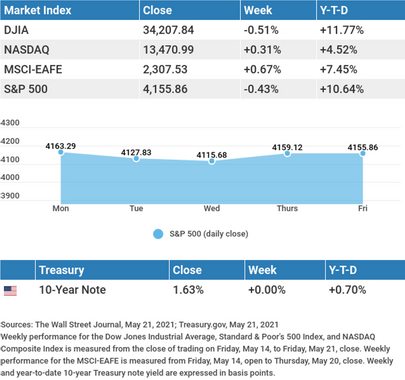
Stock prices fluctuated amid inflation concerns and bargain hunting, leaving stocks mixed for the week.
The Dow Jones Industrial Average slipped 0.51%, while the Standard & Poor’s 500 dropped 0.43%. The tech-heavy Nasdaq Composite index advanced 0.31%. The MSCI EAFE index, which tracks developed overseas stock markets, gained 0.67%.1,2,3


Lots of Motion, Little Movement
Stocks began last week extending their losses from the previous week, as
the slide in technology and other high-growth stocks resumed. Inflation
worries also weighed on the market.
After steep declines in early Wednesday trading, market sentiment took a
more positive turn, allowing stocks to pare their losses as the session
came to a close, despite news that the Fed could be contemplating
tapering its monthly bond purchases.4
This positive momentum continued into Thursday, aided by a declining
initial jobless claims number and a strong rebound in technology. The
rebound lost steam into Friday’s close, leaving stocks little changed for the
week.5
The Fed Hints at a Turn
The Federal Open Market Committee (FOMC) on Wednesday released the minutes of its April meeting. The report suggested that a number of committee participants had raised the idea that—if the economy continues to make progress—it might be appropriate to adjust the pace of the Fed’s monthly bond purchase program.4
With inflation appearing to accelerate, the markets have been watchful for signs that the Fed would begin tightening its easy-money policies. This is the first time since the pandemic that the Fed has suggested that a scaling back of bond purchases could happen, though no timetable was discussed.
It’s important to note that the April Fed meeting took place prior to the release of April’s Consumer Price Index, which showed a higher-than-expected increase of 4.2%.6
Robert Roman
CEO, Managing Director
THIS WEEK: KEY ECONOMIC DATA
Tuesday: New Home Sales. Consumer Confidence.
Thursday: Jobless Claims. Durable Goods Orders. Gross Domestic Product (GDP).
Source: Econoday, May 21, 2021
The Econoday economic calendar lists upcoming U.S. economic data releases (including key economic indicators), Federal Reserve policy meetings, and speaking engagements of Federal Reserve officials. The content is developed from sources believed to be providing accurate information. The forecasts or forward-looking statements are based on assumptions and may not materialize. The forecasts also are subject to revision.
THIS WEEK: COMPANIES REPORTING EARNINGS
Tuesday: Autozone, Inc. (AZO), Intuit, Inc. (INTU).
Wednesday: Nvidia Corporation (NVDA), Okta, Inc. (OKTA), Workday, Inc. (WDAY), Dollar General (DG), Snowflake, Inc. (SNOW).
Thursday: Salesforce.com (CRM), Costco Wholesale Corp. (COST), Best Buy (BBY), Dell Technologies (DELL).
Source: Zacks, May 21, 2021
Companies mentioned are for informational purposes only. It should not be considered a solicitation for the purchase or sale of the securities. Investing involves risks, and investment decisions should be based on your own goals, time horizon, and tolerance for risk. The return and principal value of investments will fluctuate as market conditions change. When sold, investments may be worth more or less than their original cost. Companies may reschedule when they report earnings without notice.

“Life is the art of drawing without an eraser.”
– John Gardner

Employee vs Independent Contractor: Classifying Those Who Work for You Appropriately
Classifying workers as independent contractors or employees is important for several tax reasons. The classification comes down to two main considerations: control and relationship.
Control refers to how much of the person’s work you control. This includes what work is done and how it’s done, as well as if you control the financial aspects of the person’s job. In this way, “control” means both behavioral and financial control.
Another important factor is the relationship between the employer and the worker. How both parties perceive this relationship can help you determine worker status. Some factors that influence relationship include:
- Written contracts describing the relationship the parties intended to create.
- Whether the business provides the worker with employee-type benefits, such as insurance, a pension plan, vacation, or sick pay.
- The permanency of the relationship.
- The extent to which services performed by the worker are a key aspect of the regular business of the company.
- The extent to which the worker has unreimbursed business expenses.
Knowing how to classify your workers is important because independent contractors and employees face different tax needs and implications.
* This information is not intended to be a substitute for specific individualized tax advice. We suggest that you discuss your specific tax issues with a qualified tax professional.
Tip adapted from IRS7

4 Tips to Help You Sleep Better
Sleep is one of the most important things we can do to stay healthy and energized. A lot more goes into getting a good night’s sleep than just resting your head on the pillow, so here are some tips to get some shut-eye:
- Increase bright light exposure during the day. You probably already know that it’s beneficial to keep your room dark while you sleep, but did you know that it’s also beneficial to get enough bright light during the day? These contrasts help tell your body when it’s time to go to sleep. This natural clock is called your circadian rhythm.
- Reduce blue light exposure during the evening. The light coming off our devices (including our smartphones, tablets, and TVs) is called blue light and this blue light can mess with your sleep cycle. Try to limit blue light at least 2 hours before bed. Some devices come with a setting that automatically “warms” the light to limit these blue hues.
- Try to wake up and go to sleep at consistent times: Another way to set your body’s circadian rhythm up for success is to go to sleep and wake up at the same time every day, even on weekends.
- Set your bedroom temperature: Did you know that the temperature in your bedroom can affect your sleep? Some studies show that temperature matters even more than noise. Some sleep experts recommend keeping your bedroom around 70 degrees.
Tip adapted from Healthline8

I am a word that signifies a wide natural area – but remove my first letter,
and you are left with a word signifying a narrow urban corridor. What
word am I?
Last week’s riddle: A girl has as many brothers as sisters, but each
brother has only half as many brothers as sisters. How many brothers
and sisters are there in the family? Answer: The family has four sisters
and three brothers.


Footnotes and Sources
1. The Wall Street Journal, May 21, 2021
2. The Wall Street Journal, May 21, 2021
3. The Wall Street Journal, May 21, 2021
4. CNBC, May 19, 2021
5. FoxBusiness.com, May 20, 2021
6. CNBC, May 19, 2021
7. IRS.gov, July 8, 2019
8. Healthline.com, February 27, 2020
Investing involves risks, and investment decisions should be based on your own goals, time horizon, and tolerance for risk. The return and principal value of investments will fluctuate as market conditions change. When sold, investments may be worth more or less than their original cost.
The forecasts or forward-looking statements are based on assumptions, may not materialize, and are subject to revision without notice.
The market indexes discussed are unmanaged, and generally, considered representative of their respective markets. Index performance is not indicative of the past performance of a particular investment. Indexes do not incur management fees, costs, and expenses. Individuals cannot directly invest in unmanaged indexes. Past performance does not guarantee future results.
The Dow Jones Industrial Average is an unmanaged index that is generally considered representative of large-capitalization companies on the U.S. stock market. Nasdaq Composite is an index of the common stocks and similar securities listed on the NASDAQ stock market and is considered a broad indicator of the performance of technology and growth companies. The MSCI EAFE Index was created by Morgan Stanley Capital International (MSCI) and serves as a benchmark of the performance of major international equity markets, as represented by 21 major MSCI indexes from Europe, Australia, and Southeast Asia. The S&P 500 Composite Index is an unmanaged group of securities that are considered to be representative of the stock market in general.
U.S. Treasury Notes are guaranteed by the federal government as to the timely payment of principal and interest. However, if you sell a Treasury Note prior to maturity, it may be worth more or less than the original price paid. Fixed income investments are subject to various risks including changes in interest rates, credit quality, inflation risk, market valuations, prepayments, corporate events, tax ramifications and other factors.
International investments carry additional risks, which include differences in financial reporting standards, currency exchange rates, political risks unique to a specific country, foreign taxes and regulations, and the potential for illiquid markets. These factors may result in greater share price volatility.
Please consult your financial professional for additional information.
This content is developed from sources believed to be providing accurate information. The information in this material is not intended as tax or legal advice. Please consult legal or tax professionals for specific information regarding your individual situation. This material was developed and produced by FMG Suite to provide information on a topic that may be of interest. FMG is not affiliated with the named representative, financial professional, Registered Investment Advisor, Broker-Dealer, nor state- or SEC-registered investment advisory firm. The opinions expressed and material provided are for general information, and they should not be considered a solicitation for the purchase or sale of any security.
Copyright 2021 FMG Suite.

